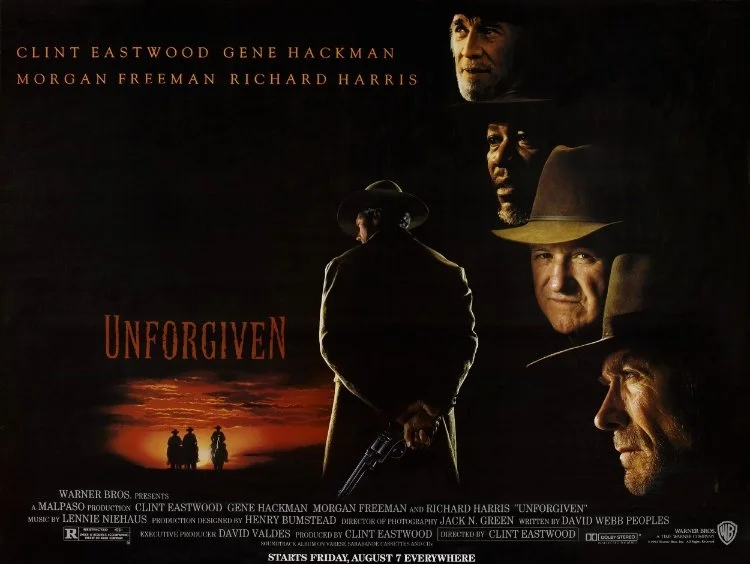Unforgiven: A Return to Big Whiskey
Unforgiven, Warner Bros. (1992)
By Nick M. W.
Starring: Clint Eastwood, Gene Hackman, Morgan Freeman, and Richard Harris
Directed by: Clint Eastwood
Written by: David Webb Peoples
My dad liked Westerns.
After my parents got divorced when my brother and I were young, dad lived in a few different places, all far enough away to make flying the preferred method of travel. Phoenix was one of those places for several years. Maybe it was the constant reminders of Arizona’s “Wild West” past — the days when it was a territory, before places like Tortilla Flat and Tombstone became tourist traps. I’m not sure what it was, and I’ll never know because dad has passed into the cosmos, but there was something about living in Phoenix that seemed to enhance dad’s sentiment for Westerns.
Watching one or two of them during our summer visits with the old man became a tradition, and there was a run of Western flicks that kicked off in the late-80s and stretched into the 90s, led by the 1989 epic network TV mini-series Lonesome Dove, forbearer of the genre’s late-century resurgence. It was a first of its kind hit, and we know movie studios follow the money. They were willing to take a risk producing something in a genre that was considered dead in the 80s, opening the door for more Westerns to hit the silver screen. Lonesome Dove was one of my dad’s favorites — we watched it every summer — but Unforgiven held a special place in his heart.
The 1992 revisionist Western turned 30, which is enough of a reason for me to take a tripe back to Big Whiskey, Wyoming, for a retrospective on the greatest Westerns ever made.
Ned and Will. Will and Ned. Unforgiven, Warner Bros. (1992)
Unforgiven is about former outlaw-turned-Kansas pig farmer, William Munny (Clint Eastwood). He’s been two years a widower, struggling to make it and take care of his daughter and son. A cocky young bounty hunter named the “Schofield Kid” rides up to the farm one day looking for the legendary outlaw. He wants to recruit him to collect a thousand-dollar bounty on two cowboys who brutally assaulted a prostitute, Delilah (Anna Thompson), in Big Whiskey, Wyoming. It’s obvious that the Schofield Kid is exaggerating his experience and skill as a bounty hunter (we find out later that not only is he lying, but he also has bad eyesight). Munny initially rejects the Kid’s offer, but later changes his mind given the lack of options he has to get out of poverty that don’t involve using his gun. So, he’s off to Wyoming, leaving his young son and daughter behind to fend for themselves while he’s gone. Ironic; he’s needs to make some money to help his family survive, but he has to leave his kids alone for a week and some change to make that money.
As he rides northwest from Kansas, Munny recruits his old road dog, sharpshooter Ned Logan (Morgan Freeman) before eventually catching up with the Kid. Ned is as reluctant as Munny was to return to a life of violence after living peacefully for so long, but it doesn’t take much effort for Munny to convince Ned to ride with him to Big Whiskey given the chance they have to make several hundred dollars apiece. The opportunity is too good for Ned to pass up, and the trio ride to Wyoming.
Meanwhile, the story unfolds in Big Whiskey, where sheriff Little Bill (Gene Hackman) upholds order with an iron fist. He’s banned guns in the town, and he enforces that law without compromise. He beats the hell out of the first bounty hunter to roll into Big Whiskey, old English Bob (Richard Harris). Little Bill sends him packing in a vulgar display of power, and all the prostitutes are shook. They’re now convinced they’ll never get proper justice for what them cowboys did to Delilah. Well, Munny, Ned, and the Kid deliver “frontier justice”, but it comes at a cost.
“Don’t pull the thang out, unless you plan to bang.” Unforgiven, Warner Bros. (1992)
Unforgiven, like other revisionist Westerns, explores the idea of the antihero, and the morally ambiguous line that type of character walks on their way to doing what they believe is the right thing. They move between amoral and principled actions, putting into question who the “good guys” are, or if there are any at all. William Munny tries to return to an old way of life to do what’s right for his family, to lift them up out of poverty, but the job requires him to get blood on his hands, an impossible task for him to achieve now that he is a reformed killer. He’s got to become that return to his bad ways again. Turns out that’s easier for him to step back into those boots than he thought, and throughout the movie, it seems like he’s fighting the urge to be that bad man again. My dad loved this about Unforgiven.
I love Unforgiven because it reminds me of my dad, a flawed man with an undignified past who ultimately desired to walk this earth with a pure heart. It reminds me of the hot ass summers in Phoenix with my brother, where I fell in love with Westerns. It gives you elements of traditional Western movies but with Clint Eastwood’s pension to humanize characters and show them operate in the moral gray areas in which so many of us exist. 30 years later, it’s still so damn good.




